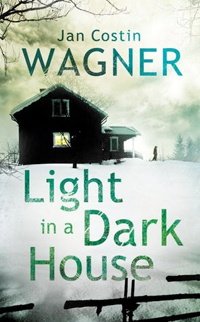Finnish detective Kimmo Joentaa is called in to investigate the murder of a woman in a hospital bed. Two strange aspects of the killing immediately arrest our attention. The victim is an unidentified woman who had been in a coma as the result of an attack, long before her murder. The other thing is that apparently someone, presumably the murderer, has left tears on her body. Who killed the comatose woman and wept for her?
In addition to the mysterious murder victim, there are also two other female characters who continually habituate Joentaa’s world in Light in a Dark House. One is his dead wife, who died in the very same hospital, and whose memory still haunts him. The other is his new girlfriend Larissa, a mysterious prostitute. Larissa disappears around the time of the murder and directly after a dinner party wherein it becomes obvious Kimmo’s chief was one of her clients under the alias ‘August’. All three women – the victim, the wife and the love interest – are essentially absent, yet their presence permeates the moody course of the investigations, which take place in snow-laden Finland just before Christmas.
The book gradually relays the back-story of the victim, leading up to her death, as recorded in the unidentified killer’s diary. Meanwhile, as the police try to determine the coma patient’s identity, more murders pile up that are somehow related. Kimmo’s colleagues are chasing down leads while the preoccupied Kimmo wanders around with the burden of his wife’s death, the whereabouts of Larissa, and the mysterious tear-stained corpse. Sometimes the central mystery takes a back seat to our detective’s musings and personal tangents, such as a friend’s gambling problem. Often, these ponderous meanderings mean that it is the killer’s diary that seems to propel the story rather than the narrative of the investigation. Eventually, Kimmo starts to receive emailed clues about the investigation that seem to come from the missing Larissa.
Readers new to Jan Costin Wagner may initially balk at the slow pace and the morose ramblings of its unusually sensitive detective. Wagner is not an ordinary crime writer nor are his novels ordinary procedurals. I picked up this book expecting an alternative take on Scandinavian crime fiction, as Costin Wagner writes in German but sets his stories in Finland where he resides. In many ways, his work represents some of the best in contemporary fiction. In terms of Nordic fiction, Costin Wagner can be compared to Johan Theorin’s thoughtful, atmospheric mysteries, wherein the detective figure is often peripheral to the existential tenor of the mystery. As crime fiction, Light in a Dark House’s broad ruminations on sadness and loneliness will be seen as a deficit for many enthusiasts of the genre.
A sudden spark of hope at the end of Light in a Dark House – the title refers to the absent Larissa – might make up for the sustained sadness that prevails from its opening pages. However, it may also be a point of frustration for some readers. Although the central mystery is resolved, all threads of the story are not tied up, and the ending is a bit abrupt. This might be attributed to the fact that this is the fourth in the Kimmo Joentaa series, presumably with more to come. One thing’s for sure, don’t expect a fast-paced thriller. Recommended for fans of mysteries who want to pause and ponder the human condition.
Harvill Secker
Print/Kindle/iBook
£8.54
CFL Rating: 3 Stars










